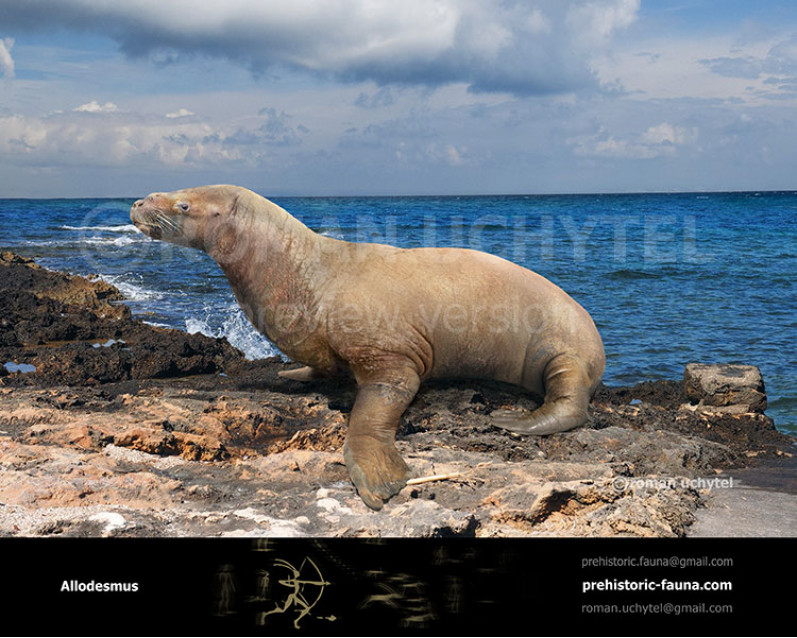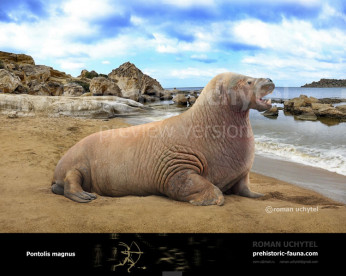Allodesmus
441441
Allodesmus (†Allodesmus (Kellogg, 1922))
Order: Carnivora
Suborder: Caniformia
Superfamily: Pinnipedia
Family: † Desmatophocidae
Temporal range: from the middle to late Miocene of California and Japan
Dimensions: length - 2,4 m, weight - 350 kg
Allodesmus is an extinct genus of pinniped from the middle to late Miocene of California and Japan that belongs to the extinct pinniped family Desmatophocidae.
Allodesmus measured about 2.4 m long and weighed 360 kg. Allodesmus had the specific anatomical features found in modern polygynous pinnipeds: sexual dimorphism, strong canines for fights between bulls and teeth with well-defined growth zones, a result from periodic fasting (in order to defend their harem, males would not take to the sea to feed during the breeding season).
Allodesmus sinanoensis and A. packardi were previously assigned separate genera, Megagomphos and Brachyallodesmus, respectively, but many authors questioned this generic distinction, and the cladistic analysis by Boessenecker and Churchill (2018) found no support for this generic scheme. Atopotarus, referred to Allodesmus by some authors (e.g. Mitchell 1966), is distinct from Allodesmus by the absence of a prenarial shelf and M2, double-rooted cheek teeth, a small, triangular postorbital process, and a mastoid process projecting ventral to the postglenoid process.
From Wikipedia, the free encyclopedia
Оплата
У Вас є кілька зручних способів купівлі зображення: кредитна чи дебетова картка Visa, Mastercard, Maestro; PayPal або банківський переказ
Allodesmus (†Allodesmus (Kellogg, 1922))
Order: Carnivora
Suborder: Caniformia
Superfamily: Pinnipedia
Family: † Desmatophocidae
Temporal range: from the middle to late Miocene of California and Japan
Dimensions: length - 2,4 m, weight - 350 kg
Allodesmus is an extinct genus of pinniped from the middle to late Miocene of California and Japan that belongs to the extinct pinniped family Desmatophocidae.
Allodesmus measured about 2.4 m long and weighed 360 kg. Allodesmus had the specific anatomical features found in modern polygynous pinnipeds: sexual dimorphism, strong canines for fights between bulls and teeth with well-defined growth zones, a result from periodic fasting (in order to defend their harem, males would not take to the sea to feed during the breeding season).
Allodesmus sinanoensis and A. packardi were previously assigned separate genera, Megagomphos and Brachyallodesmus, respectively, but many authors questioned this generic distinction, and the cladistic analysis by Boessenecker and Churchill (2018) found no support for this generic scheme. Atopotarus, referred to Allodesmus by some authors (e.g. Mitchell 1966), is distinct from Allodesmus by the absence of a prenarial shelf and M2, double-rooted cheek teeth, a small, triangular postorbital process, and a mastoid process projecting ventral to the postglenoid process.
From Wikipedia, the free encyclopedia



-797x638.jpg)


-70x56.jpg)


